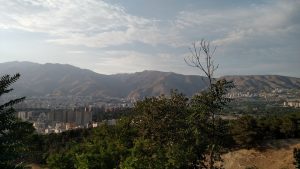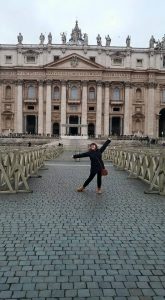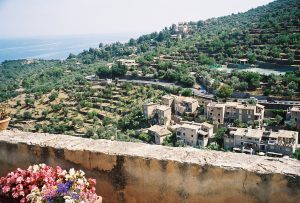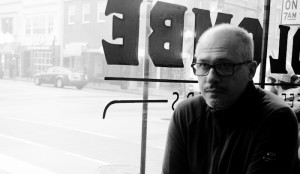
Interviewed by Todd Summar
Aleksandar Hemon slips fluidly between genres and forms, each project an unexpected new entity, yet still part of a continued conversation with the world around him. Born in Sarajevo, Hemon was visiting Chicago in 1992 during the outbreak of the war in Bosnia. He stayed here and became a United States citizen in 2000, the year his first book, the short story collection The Question of Bruno, was released. His writing, in various ways, has been colored by the experience.
Released last May, Hemon’s darkly comic novel The Making of Zombie Wars was a surprise not only to longtime readers familiar with Hemon’s more serious (but still often humorous) tone but also to his agent, whom he surprised with the manuscript at a meeting in 2013. Though Zombie Wars is, as Hemon describes it, a farce, it tackles themes that have long preoccupied him—the immigrant experience in America, the harmful effects of war, the American privilege of avoiding big problems. Joshua, the protagonist, writes a zombie-centric screenplay in 2003 that reflects the jingoistic mood of the country as the U.S. invades Iraq. Like many of Hemon’s previous books—the 2013 essay collection The Book of My Lives, the 2008 novel The Lazarus Project (a finalist for the National Book Award), and the 2002 novel in stories Nowhere Man, to name a few—Zombie Wars sees the author flaunting the irrelevance of the line between nonfiction and fiction. In fact, he’s often been quoted as saying that there is no Bosnian word for the literary distinction between the two.
I met Hemon at a coffee shop in the Andersonville neighborhood of Chicago shortly before Christmas. The holiday music playing in the background was a bizarre soundtrack to our conversation. Hemon was later headed to the studio where he writes. Though we had previously met through mutual friends, I never had the opportunity for an in-depth conversation with him. It’s easy to become distracted by Hemon’s impressive identities: critically acclaimed author, contributing writer at The New Yorker, winner of the MacArthur “genius” grant, writer-in-residence at the United Nations Headquarters. But as we spoke, shared a laugh over the cringe-inducing music, and commiserated about the state of U.S. politics, it was easier to see him both as a hard-working writer with a disarming sense of humor and as a concerned citizen of the world.
Todd Summar: You’ve said that you do not see a distinction between nonfiction and fiction and that you think more in terms of story. What determines whether something becomes an essay or fiction, and do you know before beginning?
Aleksandar Hemon: I do usually. Recently, I wrote a nonfiction piece and I turned it in to a major magazine and they had all these fact-checking questions. Some of the facts are not checkable because so much had happened long in the past and had been passed on to me by way of family stories. It’s about my father’s uncle who spent twenty years or so in a Stalinist concentration camp. He was born in Bosnia, then became a Communist, then went to the Soviet Union where he spent thirty years, twenty of which he was in the Gulag. The piece is about how stories are passed until they’re distorted. The original experience is not available, except as a story. I tried to rewrite it as a fiction piece, but that failed because it didn’t need fictionalization. It was embedded in history. Fictionalization was doable but not necessary. It has to be necessary. And this is the only time, as far as I know, that I tried to convert something that I had written as nonfiction into fiction. I don’t have a set of criteria that determines this; I just know this story needs little embellishment. In the novel that I recently published, The Making of Zombie Wars, the starting point was my thinking about a time when I was teaching English as a second language. A student made a pass and I declined it and nothing happened. If something had happened, then I guess that could have been a nonfiction piece in some iteration. But if nothing happened, then what do you do? So I made up something.
Continue Reading
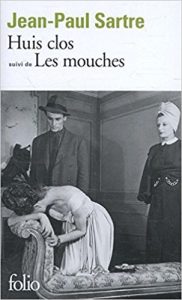 My professor and I were back at the Théâtre du Nord-Ouest for Huis Clos, Jean-Paul Sartre’s existentialist masterpiece about three people locked in a room for eternity, each torturing the others by their very existence, creating a unique form of hell. I hadn’t heard of most of the plays we saw that summer on our grant-funded research trip to Paris; Les Fourberies de Scapin isn’t exactly world famous. But even I had heard of No Exit. And, at first, it lived up to the Nord-Ouest’s reputation. The Garçon (renamed the Valet in English translations) delivered all his lines with an unnerving coolness as he escorted the newcomers into hell. Garcin alternated between moments of forced calm and small explosions of panic, and there was a certain raw hoarseness to his voice in his vulnerable moments that boded well for his breakdown through the rest of the play.
My professor and I were back at the Théâtre du Nord-Ouest for Huis Clos, Jean-Paul Sartre’s existentialist masterpiece about three people locked in a room for eternity, each torturing the others by their very existence, creating a unique form of hell. I hadn’t heard of most of the plays we saw that summer on our grant-funded research trip to Paris; Les Fourberies de Scapin isn’t exactly world famous. But even I had heard of No Exit. And, at first, it lived up to the Nord-Ouest’s reputation. The Garçon (renamed the Valet in English translations) delivered all his lines with an unnerving coolness as he escorted the newcomers into hell. Garcin alternated between moments of forced calm and small explosions of panic, and there was a certain raw hoarseness to his voice in his vulnerable moments that boded well for his breakdown through the rest of the play.

